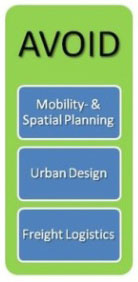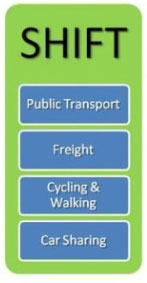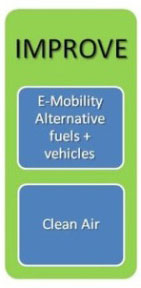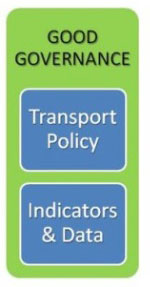Under Construction!
Eurist WebpageWe are reworking our website and will be back with a new design on
20.03.2020
Until then, here is some basic information about Eurist and our goals
For further information,
please do not hesitate to contact us by email.
WELCOME!
EURIST
European Institute for Sustainable Transport
is a non-governmental organisation promoting policies that improve the environmental, social and economic sustainability of transport and mobility around the world.
Our work focuses on the relation between transport and CO2 emission reduction, transport and the Millennium Development Goals, Poverty Alleviation, Environmental Protection, Road Safety and Freight.
EURIST is based in Hamburg, Germany´s second biggest city and economic hub for northern Europe. We work with an extensive network of national and international partners.
Read more about EURIST’s origin story here:
What we do
As a Centre of Competence for Sustainable Transport we transfer best practice to cities, local and regional governments. We provide project assistance, capacity building, lectures and seminars on different areas in passenger and freight transport.
We raise awareness of sustainable mobility issues among present and future decision-makers and aim to improve the basis for decision making , providing information and advice.Together with the governments in charge we design realistically applicable strategies and multidisciplinary tools for the solution of mobility issues worldwide.We are aiming at a modern, convenient, safe, socially inclusive, economically effective, environmentally respectful and joyful mobility for everybody!
Kurt Bodewig, former German Transport Minister
“Especially EURIST´s focus on public transport and the increased use of the bicycle in urban mobility are important to me.
Due to my experience as a former Transport Minister I strongly support an increase of safe walking „and cycling and the use of public transport.
Michael Cramer, Transport Committee of the European Parliament

“EURISTs work is important to me, because in the EU, transport is now responsible for 30% of all CO2 emissions. While in the industry since 1990, CO2 emissions were reduced by 34%; in the energy sector by 17% and in households by 14%, they have risen by almost 30% in traffic.”
This way traffic cancels out more than twice of what has been achieved in other sectors with billions of our tax dollars
Erik Zabel, Germany´s most successful cyclist

“Safe cycling conditions are important to all. As a patron of EURIST´s global Cycling Projects I can emphasise this goal even better…”
Jörg Pilawa, famous german moderator

„Supporting EURIST is a matter close to my heart. In Africa, a simple bicycle is the chance to improve the living conditions of an entire family. It makes daily work easier for women and girls and helps to save time. Time that is then available for other important tasks such as homework.“
Reinald Achilles, UPSOLUT Event Agency Hamburg
Our Vision
As a nonprofit organisation we want to help cities, governments and communities to develop good transport governance and reform local and national transport systems, reducing transport needs, shifting to more sustainable modes and improveing the systems efficiency. We want to raise awareness and transfer knowledge to decision makers in order to create a basis for a paradigm change in mobility policy towards sustainable mobility for all!
Our Challenge
The development of sustainable transport and mobility systems in an increasingly urbanised world will become one of the most challenging global issues of the future. Sustainable transport is a key ingredient in creating liveable cities and achieving the Millennium Development Goals.
There is also a pressing need to reduce the consumption of resources, transport-related greenhouse gas emissions and other air pollutants
The Problem
Most cities or regions receiving international assistance to make their transport systems more sustainable are often focused on technological solutions and do not have a holistic long-term policy on how a change in their mobility systems can be achieved. Investments in technological solutions have little impact in the big picture since transport systems in many regions of the world are not ready to apply them. It must also be assumed that the increasing number of motor vehicles and the growth in freight worldwide will cancel out efficiency gains from improved technologies.
To be effective the technological solutions have to be included in tailormade packages for a specific geographical, cultural and social context, relying on local research and best practice examples.
Our Strategy
The Avoid-shift-improve strategy aims on a combination of non technological and technological solutions in a tailormade package for a specific geographical, cultural and social context.




AVOID
This does not only pave the way for individual non motorized transport solutions like cycling and walking, it is also the ideal scenario for effective public transport systems or freight logistics because it generates bigger demands.
IMPROVE
SHIFT
PUSH and PULL measures, like Speed management or reduction in the supply of parking on one hand and incentives in service quality for the alternative modes fo transport on the other hand are able to shift mobility habits from the use of individual motorized vehicles to alternative modes
GOOD GOVERNANCE
The Avoid – Shift – Improve Strategy is suitable to apply it not only on urban scale transport planning but as well on national and even international scale. The bigger the scale, the bigger the need of comparable data and indicators, which can be used to spread and apply new standards in transport.

